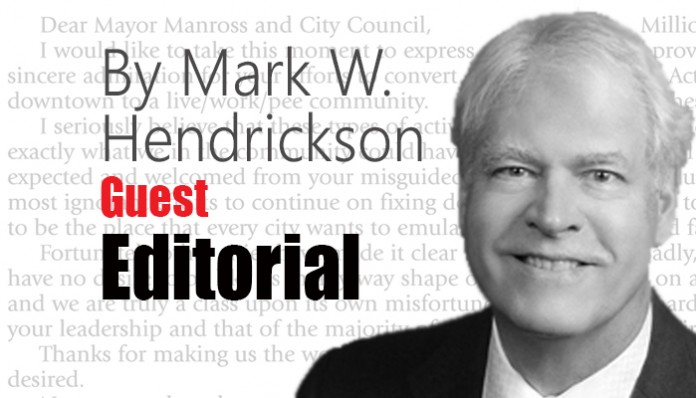Do you remember the band Chicago’s 1970 single, “Does Anybody Really Know What Time It Is?” I thought of it the other day in connection with the U.S. debt problem, except I tweaked the lyrics: “Does anybody really know how much debt there is? Does anybody really care?”
Indeed, there are oceans of red ink all around, but the collective response of Americans is massive indifference. It isn’t because the problem isn’t being reported. All year long, the financial press has dutifully reported record levels of debt, but all the public does is yawn – and continue to borrow. Here are some 2017 headlines:
“Americans now have the highest credit-card debt in U.S. history,” Marketwatch.com, Aug. 8
“Student Loan Debt in 2017: A $1.3 Trillion Crisis,” Forbes.com, Feb. 21
“A record 107 million Americans have car loans,” CNN Money, May 19
“U.S. Household Debt Hit Record in First Quarter,” The Wall Street Journal, May 17 (according to the Federal Reserve, household debt rose $114 billion to another new record in the second quarter)
“Corporate debt is at new highs…,” CNBC.com, April 11
You get the idea.
And because, as Joseph de Maistre once sagely observed, “Every country has the government it deserves,” it is unsurprising that a people who embrace debt as a way of life in their private lives would have heavily indebted governments. Thus, there are the underfunded state pension plans (“US faces crisis as pension funding hole hits $3.85tn,” Financial Times, May 15); hopelessly bankrupt states like Illinois (“How Illinois became America’s failed state,” Politico.com, June 10); and dear old Uncle Sam whose on-budget (i.e., the publicly acknowledged portion) debt exploded through the $20-trillion mark recently. (The federal debt has risen more than $160 billion above $20 trillion since then.)
So, who is concerned about these unfathomably large amounts of debt?
Well, I am and so are many other Americans who still hold to the out-of-fashion notion that it is prudent to live within one’s means. But overall, Americans don’t care, and so these reports of record debt fail to gain traction as a vital public issue. In psychological terms, Americans have become habituated to debt. Rising debt has become so pervasive and so permanent a phenomenon that it simply doesn’t register with most people any more.
I thought that might change for a few brief weeks this month with the federal debt ceiling coming into play, but Hurricane Harvey and President Trump’s deal with the Democrats have muted, if not postponed, that debate for at least a few months. If congressional Republicans do insist on trying to retain the farcical debt ceiling, then we will once again be subjected to what I call “The Debt-Ceiling Dance and the Annual Budget Ritual.” That’s the routine in which progressives pooh-pooh debt and accuse those who want to limit it of being cold-hearted cheapskates while conservatives decry the economic folly and ethical blight of debt. In the end, though, the result will be the same: federal debt will continue to rise.
What explains the mountains of debt? Our social ethos has come to be: Eat, drink, and be merry today, and pay for it tomorrow. Well, maybe pay for it tomorrow. With the Sanders Socialists among the Democrats talking about things like free college for all, the old-fashioned notion of paying for what we consume – either in the present or via debt repayments in the future – is being fundamentally challenged.
As problematical as today’s excessive private debts are, at least private debt is the product of voluntary agreements between adults. Public debt, on the other hand, has a darker, morally repugnant side. The present democratic political system is all about some Americans getting benefits that other Americans pay for. The result is an incessant strident squabble between those demanding more goodies from Washington and those who resist having even more of their property taxed to finance those handouts. Both sides have political clout, and the result is often a political standoff. How are Washington politicians to placate both federal beneficiaries and current taxpayers? The simple answer: debt.
Politicians borrow the money to increase present spending and send the bill for that spending to future taxpayers. This is the moral repugnance of public debt: Much of the burden of debts incurred today will be borne by those who are too young to vote today. The young and unborn are disenfranchised, hence powerless and without leverage in our democratic process. They are the helpless victims of cruel, undemocratic “taxation without representation.” As Jefferson told us long ago, government debt amounts to “Swindling America’s Youth,” which is about as ugly and debased a public ethos as one can imagine.
We are caught in a downward, self-destructive spiral. Odds are, we won’t be able to pull ourselves out of it. In the private sector, debt as a way of life has become habitual. In the public sector, the debt problem is systemic – the inevitable product of the dynamics of our ethically challenged democratic system.
For the present, millions of Americans have convinced themselves that debt doesn’t matter. In the short term, they may be right. Debt doesn’t matter until the day it does – the day when the piper comes to be paid and the financially over-extended can’t pay.
— Dr. Mark W. Hendrickson is an adjunct faculty member, economist, and fellow for economic and social policy with The Center for Vision & Values at Grove City College.





